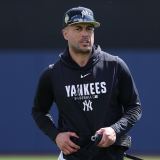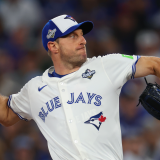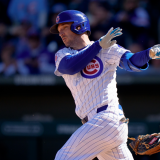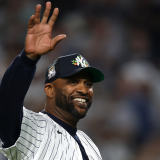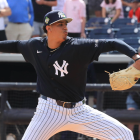Kevin Durant's signing a reminder of the assault on parity and fairness in sports
How much can sports leagues manipulate the rules to make parity happen?
Kevin Durant signing with the loaded Golden State Warriors invites all kinds of on-court analysis. How much will Durant improve the Warriors' already fearsome "death lineup"? Can Durant be a capable rim protector when the Dubs roll out those small, terrifying fivesomes? And how the hell is anyone going to stop a Steph Curry-Kevin Durant pick-and-roll?
That's not what the masses are talking about, though. The visceral reaction to Durant joining a team that just set the single-season NBA record for most wins in a season boils down to two, related ideas: parity, and fairness.
On some level, you can maybe squint and start to understand the complaints. Durant joins a team that would have won the mantle of greatest of all time, if not for LeBron James's incredible three-game run, culminating in history for both his Cleveland Cavaliers, and the league as a whole. That stirring comeback came after an incredible comeback by the Warriors over the Thunder, with Curry, Klay Thompson, Draymond Green and friends falling behind 3-1 in the series, then storming back to win in seven.
As reductive as it might be to say it, you can't deny that there's a certain amount of "if you can't beat 'em, join 'em" logic here. Bird would never join Magic (or vice versa) after getting beat, goes the thought process; he'd bust his ass all summer so he could get revenge the next season. Plenty of thoughtful journalists have called Durant's move something akin to a copout. Hell, when James chose to join his pals Dwyane Wade and Chris Bosh in Miami, Durant himself complained on Twitter that forming superteams was passe.
Now everybody wanna play for the heat and the Lakers? Let's go back to being competitive and going at these peoples!
— Kevin Durant (@KDTrey5) July 16, 2010
In doing so, he extolled the old sports refrain that to be the best, you should have to beat the best.
Suffice it to say, I disagree with this take. Thanks to the courage of pioneers like Curt Flood, professional athletes now have the right to choose where they want to play. Even those rights aren't absolute, though. Sports teams control player rights for the first several years of that player's career. When you get right down to it, even the much-hyped drafts that the NBA, NFL, MLB, and other sports leagues hold every year are, in some ways, immoral. If Durant wants to play with great players in pursuit of a ring, awesome. LeBron choosing to do the same a few years ago in Miami? Sure, why not.
Still, the notion of preserving parity and fairness in sports resonates, with players, fans and media. Which raises some broader questions: Is parity even a good thing? And if it is, how much can sports leagues manipulate the rules to make it happen?
The answer to your first question likely depends in large part on your rooting interests. If you're a Warriors fan, you're elated about the addition of Durant, much as a Yankees fan was when back-to-back AL Cy Young winner Roger Clemens was traded to the Bombers following a 114-48 season and a World Series sweep. If you're a fan of sheer greatness, you're probably on board too. Watch Curry bury impossible shots, and Thompson go on a historic, season-saving shooting jag, and you salivate at what the Warriors might do with Durant. How many points a game will they score? How beautiful and fluid will an offense built on spacing, ball movement, and supreme court awareness look now that a 6-foot-9 sniper has been added to the mix? Why favor some artificial idea of fairness, when you can watch the greatest collection of shooters in league history dazzle our collective imagination?
On the other hand, if your fandom is rooted first and foremost in your favorite team, and that team isn't Golden State, the Durant signing won't seem nearly as fun. Teams like the Celtics, Jazz, and Knicks have made multiple intriguing moves in the past few days, and it all seems futile anyway, because they all have essentially no chance this season (insert snarky Knicks joke here as needed). When used car salesman/1994 postseason killer Bud Selig said he wanted all fans to have hope and faith, the 2016-17 NBA season isn't what he had in mind.
But if the supercharged Warriors represent the ultimate affront against parity in sports, the broader question remains: What can sports leagues do about it?
First, let's dispense with the notion that a salary cap is the answer, because the NBA already has one. The Warriors certainly built the core of their dynamic team via the homegrown route, drafting and developing Curry, Thompson, and Green. But Curry's monumental bargain of a contract, combined with the NBA's skyrocketing cap, and a lack of agreement on how to smooth out the abrupt jump in that number, made the Durant contract possible. Granted, the same cap rules apply for every team. But Durant wasn't the only player enticed by Golden State's championship aspirations: Veterans Zaza Pachulia and David West signed on at veteran-minimum salaries too, thus negating any concerns that the Warriors might not be able to fit any capable supporting players under the cap.
More broadly, the notion that a cap helps competitive balance in any sport is dubious at best. Four teams -- the Lakers, Celtics, Bulls, and Spurs -- have won 24 of the past 36 NBA titles. That despite the cap getting introduced 32 years ago. The NHL's cap has forced teams to unload lots of quality players over the years, yet the past eight seasons have been a merry-go-round of Stanley Cups for the Blackhawks, Kings andPenguins. The NFL has shown more parity in recent years, though that league also has the advantage of offering cakewalk schedules to last-place teams and murderers' row slates to first-place teams, to further encourage competitive balance.
The sport with the widest array of winners over the past three decades is Major League Baseball. MLB is also the one sport of North America's big four that doesn't have a salary cap. That's not for lack of trying, of course. Twenty-plus years ago, baseball's revenue-sharing system amounted to rich teams sharing a pack of Twizzlers with poor teams. The have-nots complained to the league that they couldn't possibly compete with the haves unless a more aggressive revenue-sharing system was implemented. Teams like the Yankees said they would be happy to share revenue ... if players would agree to a salary cap that would curtail their earnings, that money getting redirected to poorer teams without their richer counterparts having to pay a dime out of pocket.
Baseball's players union, which had been the strongest of any major sports league dating back to Marvin Miller's arrival as head of the players association in the mid-1960s, quickly balked at the proposal. When the owners wouldn't budge, the players went on strike, understanding full well that salary caps guarantee one and only one thing: That players wouldn't be able to earn their full market value, and that those extra funds would end up in owners' pockets instead.
The resulting labor stoppage wiped out that year's entire postseason as well as the start of the 1995 campaign. But the players' resolve eventually paid off, with the owners agreeing to implement more aggressive revenue sharing, sans major concessions from the union.
Major League Baseball has since seen plenty of lower-revenue underdog teams accomplish great things, from the Moneyball A's to the Joe Maddon-era Rays to the 2015 World Series-winning Royals. When it comes to parity, baseball certainly has it.
What it sometimes lacks, though, is fairness. On Sunday, the Dodgers outrighted Cuban prospect Yaisel Sierra off their 40-man roster. The move came just four-and-a-half months after L.A. signed Sierra to a six-year, $30 million contract. The rest of the league was so unimpressed with Sierra's repertoire (and his 7.16 ERA at Class A Rancho Cucamonga) that nobody even bothered to take a flyer on him; he passed through waivers unclaimed. SB Nation's Grant Brisbee detailed some other big-money fruitless signings by the Dodgers, which include Alex Guerrero and Erisbel Arruebarrena, both in the past couple years, both no longer in the organization.
Those huge failures, which amount to $83 million flushed down the train, scarcely mattered. The Dodgers hit the jackpot by signing Yasiel Puig out of Cuba for $36 million, a number that dwarfed other teams' offers but ultimately proved to be a huge bargain ... even if we never see anything like the rookie-year version of Puig again.
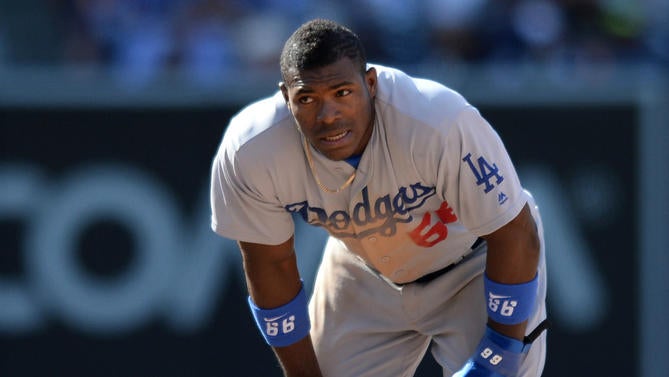
The team's stable of analytically-inclined decision makers understand that injuries and performance declines happen all the time, so they try to build contingency plan upon contingency plan, to ensure they have the depth to absorb all kinds of bad news. And while the Dodgers do share revenue, they also have an $8.3 billion local TV deal in hand; even sharing one-third of that amount per MLB mandate, that's nearly $6 billion to play with over the next 25 years, before they've sold a single game ticket or Dodger Dog.
Yes, the Dodgers' owners did spend more than $2 billion in insurance money to buy a marquee franchise in a huge media market, and yes, teams like the Rays do get to share in some of the big boys' windfall. But if the Rays misfire badly on one or two major contracts, they could be screwed for years. Take the Dodgers' nearly unlimited wealth, coupled with their strategy of building as much depth as possible, and the Sierra, Guerrero, and Arruebarrena whiffs represent more of a feature than a bug.
The Dodgers aren't the only big-money team to spend gobs of money and challenge the boundaries of fairness in the sport. In 2014, over a span of three months, the Red Sox spent more than a quarter of a billion dollars to lock up Pablo Sandoval, Hanley Ramirez, and Rusney Castillo for either most or all of the rest of the decade.
Sandoval posted the worst offensive season of his career (by far) in Year 1 of his deal, coupled with horrific defense. He reported to camp looking like he ate the entire state of Rhode Island, played in just three games, then fell to a shoulder injury that knocked him out for the year.
Castillo played in major-league games last year, was equally inept with the bat and snuck in eight big-league at-bats this season before falling so far so fast that the Sox placed him on waivers last month. He went unclaimed, because he can't play and is owed more than $50 million through 2020.
The prized pig of the trio is Ramirez, who's batted a playable .289/.368/.436 while playing half his home games at hitter-friendly Fenway Park. Yet add up Ramirez's 2015 and 2016 performances and he still rates as below replacement level, one of the worst players in the entire major leagues over the past year and a half.
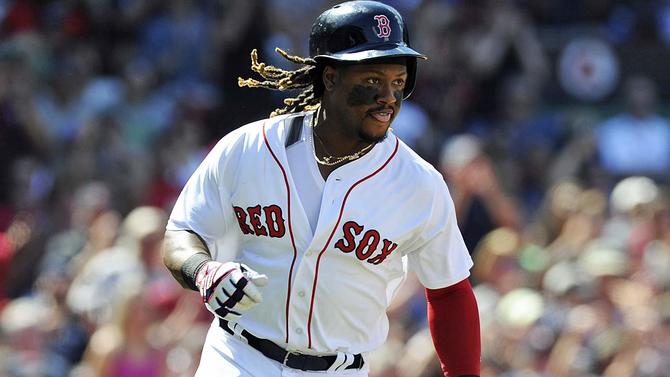
Even with all that wasted money, combined with MLB cracking down on Boston's violations of international signing rules, none of it really matters: The Sox are still contenders, loaded with young talent at the big league level and plenty more of it down on the farm. The Red Sox owners invested plenty of money and sweat equity into building up the organization, so you can't say their success hasn't been earned. And while they've won three World Series since 2004, there have been some lean years too. Still, the margin for error in Boston is many times larger than it is for poorer rivals across the league. The Red Sox may not have ruined MLB's parity, but they've certainly tested the boundaries of fairness.
In multiple sports, we could see things incrementally improve. The giant leap in the the NBA's salary cap will drastically affect this summer and next, after which spending should become more predictable. And just as the Curry-led Warriors went from decades of incompetence to championship glory, young and skilled teams like the Timberwolves could eventually trace a winning path, after bagging building blocks like Karl-Anthony Towns and Andrew Wiggins.
In baseball, some of the poorer teams will see their woefully below-market local deals expire in the next few years, offering a chance to pump new money into their coffers -- assuming TV viewers' unplugging from pricey cable and satellite packages doesn't torpedo everything first. MLB worked out a deal to suppress salaries in the amateur draft, and we'll probably see an international draft in the next few years too, thus further curtailing efforts by the Red Sox and other clubs to get around the rules.
The NFL has problems a mile wide ranging from a head trauma epidemic to a power-mad, unaccountable commissioner, but even teams in small markets can lean on real hope and faith, assuming they have smart management at the helm.
As for the Gary Bettman-led NHL ... uhhh, we'll get back to you.
Still, no system will ever come close to being perfect. There will be more superteams, more rich clubs flexing their financial muscle to cover up brutal personnel decisions, and poorer teams lamenting their own fate (while collecting big-ass checks from their opponents).
In a sense, Ayesha Curry had it right: Sports really are rigged. The best you can do as a fan is hope that they're rigged in your favor, or that your team can find a way to beat the house anyway.



